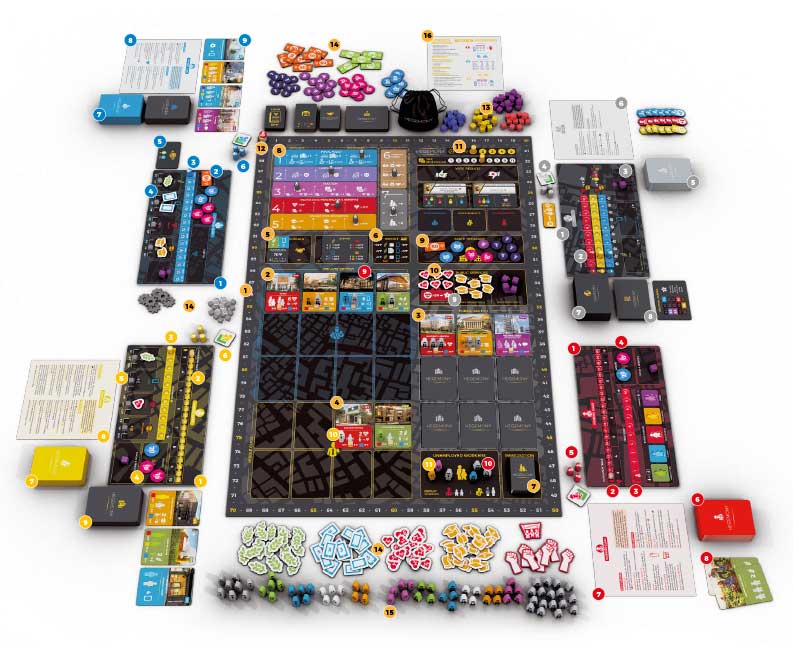Introduction: The Basics
Hegemony is a 2–4 player, asymmetric, card-driven political economy game. Each player controls one pillar of society with a unique scoring engine and toolkit:
- Working Class (WC): Scores mainly via Prosperity (health, education, luxury). Leverages Trade Unions, Strikes, and Demonstrations.
- Middle Class (MC): Hybrid producer/consumer. Scores via Prosperity but excels at self-supplying goods/services to chain multiple prosperity bumps.
- Capitalist Class (CC): Scores via Wealth from profitable companies. Lives and dies by Taxation and Labor Market policy.
- The State: Scores via Legitimacy (balance among the three classes) and runs public services. Must avoid IMF intervention.
Core systems you’ll interact with
- Policies & Bills: Seven policy tracks (Fiscal, Labor, Taxation, Welfare: Health, Welfare: Education, Foreign Trade, Immigration). Bills move policies one step per pass, either by Immediate Vote (right now, costs 1 Influence) or at Elections (end of round).
- Elections & Influence: Vote bag is refilled based on the board state; players then reveal optional Influence to add votes. Ties pass in favor of the proposer. Supporters only score if they contributed at least one vote (cube or Influence).
- Production & Payments: Companies pay wages and produce; populations must be fed; then taxes/obligations follow. If you can’t pay a mandatory cost at the moment it’s due, you must take Loans (in fixed chunks) until you can.
- IMF: If the State breaches its loan limit and can’t correct it during Production, IMF fires and imposes sweeping, immediate adjustments (including wages/policies) that reshape the economy.
General Table-Wide Tips
- Plan votes like you plan cashflow. If a policy affects this round’s production or taxes, consider an Immediate Vote; if not, conserve Influence for end-of-round Elections.
- Shape the bag early. Your Population and number of operational companies determine how many cubes you add when the bag refills. Staffing and building aren’t just economy, they’re also vote math.
- Don’t trigger loans by surprise. Know the precise moment payments are due (needs, wages, taxes). If you must loan, do it purposefully to unlock a bigger play.
- Watch the State’s treasury. IMF is not flavor; it’s a table-wide earthquake. Either push for it when it helps you, or stabilize to avoid it.
- Allies of convenience > permanent alliances. Coalitions shift with every Bill. Signal intentions and extract concessions.
- End every round with intention. Ask: “What did I lock for next round? What can the table realistically overturn before my next turn?”
Core Systems You Must Master
1) Bills, Votes, and Timing
- One step at a time: A Bill can only move a Policy to an adjacent space.
- Immediate Vote: Called by the proposer at the moment of proposing; costs 1 Influence; resolves instantly. Use when the change flips today’s wages/taxes/imports.
- Elections Phase: Unless voted immediately, Bills resolve here. Refill the bag based on current board state, draw, then secretly commit Influence. Ties pass for the proposer. Proposer scores 3 VP if it passes; supporters score 1 VP only if they actually contributed a vote.
Expert timing: Sometimes you propose a “middle” option that you don’t truly want, purely to lock the policy for the current round (and grab VP), knowing next round you’ll try to swing again.
2) Production, Needs, Loans, IMF
- Sequence matters: Wages → Production → Cover needs → Taxes/obligations (in that round’s structure). If, at any mandatory payment, you can’t pay, you take Loans on the spot.
- IMF trigger: During Production, if the State exceeds its loan limit and can’t fix it, IMF enforces forced policy shifts and other penalties immediately. Everyone should anticipate this and plan accordingly.
3) Influence Economy & Bag Control
- Where cubes come from: The bag is refilled using current metrics (e.g., WC/MC population, CC/MC operational companies). The State never adds cubes; it influences by spending Influence gained from its Legitimacy.
- Practical upshot: Invest in the 1–2 must-land Bills per round. Don’t nickel-and-dime Influence.

Role-by-Role: How to Win
Working Class (WC)
Your scoreboard: Prosperity jumps give VP equal to the new value. Early prosperity is king because each step pays more than the last.
Game plan
- Top priority: Buy Health/Education/Luxury in quantities equal to your Population to trigger Prosperity via Free Actions. Split purchases across sources if needed; price-hunt every time.
- Policy focus:
- Foreign Trade (6) → C: Cheap, tariff-free imports. Stabilizes Food and fuels repeated Prosperity.
- Immigration (7) → A: Slows Population growth so each Prosperity costs less. If 7 drifts upward, plan to monetize extra bodies with Trade Unions.
- Welfare (4/5): Cheaper/free services reduce your cash strain and smooth prosperity pops, but be mindful of the State’s solvency (IMF risk).
- Levers & tools:
- Trade Unions: Aim for sets of 4 WC workers in a single industry and keep them employed. This yields free Influence for votes and a steady VP drip that adds up massively.
- Strikes: Place on operational, low-wage companies to force wage hikes or stall rival production this round. Use surgically where it changes outcomes, not reflexively.
- Demonstrations: If unemployed exceed your working slots by ≥2, set it up; if it survives to Production, you gain Influence and assign VP losses-excellent deterrent to mass layoffs.
- Bills for points: Your deck often supports proactive policy. Even failed votes clean cubes out of the bag for next time.
- Openings: Early Food security + at least two Prosperity bumps in the first two rounds is a great pace.
- Common mistakes: Over-growing Population without income; ignoring Trade Unions; spamming Strikes that don’t change math.
Middle Class (MC)
Your scoreboard: Prosperity-but with a twist. You can self-supply to stack prosperity pops efficiently, and if your operational companies > current Prosperity, you often earn a free Prosperity in Scoring that offsets your higher decay.
Game plan
- Signature pattern: With Population 4, a single Buy Goods & Services action can take from two sources-one source is yourself. Example: buy 4 from your own stores + 4 from State/CC/Foreign. That fuels two Free-Action Prosperity bumps (one now, one next turn). Repeat with another resource later in the round to net 4+ Prosperity in one round.
- Policy focus:
- Immigration (7) → A: Keep Population low; MC thrives with lean needs.
- Taxation (3) → B: Often your sweet spot-keeps CC in check while not crushing you.
- Fiscal (1) → B: Enough public supply to complement your production without bleeding the State or crowding your labor market (and it nudges end-game alignment scoring).
- Operational discipline:
- Build early so you can self-supply soon. When legal/feasible, MC-only staffing pays no wages; adding WC workers boosts output but invites Strikes and wage commitments.
- Mind storage caps. Don’t waste output; time sales and buys.
- Taxes: Employment tax (operational companies × multiplier) can sting; check Taxation before expanding.
- Alternate line: Export-heavy plan (sell everything to Foreign Market; bank vardis for end-game VP). Viable if left alone, but pure Prosperity play is typically stronger with good execution.
- Common mistakes: Hiring WC right before a wage hike/strike wave; failing to maintain operational > Prosperity to secure the free Scoring-phase bump.
Capitalist Class (CC)
Your scoreboard: Wealth-advanced by turning Revenue into Capital in Scoring, then scoring at your Wealth position. Steady increases beat one-off spikes.
Game plan
- Early: build, even if it means Loans. Get companies operational immediately to scale production and enable endgame profits. Don’t “avoid building to deny WC”-you need labor throughput.
- Policy focus (the big three):
- Taxation (3) → C ASAP: This is your single largest long-term lever. Budget lobbying and Influence to secure it.
- Labor Market (2): Avoid 2A (high wages). 2B is serviceable; 2C maximizes margins but paints a strike target on your back-prepare defenses.
- Foreign Trade (6): 6A inflates import costs-great if you’re selling domestic Food/essentials. Use when it meaningfully raises today’s prices.
- Staffing & machinery:
- Prefer MC workers where legal-no Strikes, no Unions.
- Machinery enhances output but doesn’t “automate” by itself; weigh ROI carefully late.
- Cash & taxes:
- Sequence matters: Employment Tax hits before Corporate Tax on remaining Revenue. Keep buffers if Taxation might worsen.
- Lean early is fine. It’s okay to loan while 3 is bad for you-just fix 3 before your profit ramp or taxes will crush you.
- Common mistakes: Expanding production before securing Taxation/Labor cover; running razor-thin cash into a wage hike.

The State
Your scoreboard: Each round you score the sum of your two lowest Legitimacies, then halve all three. Balanced legitimacy across WC/MC/CC is crucial. Your second job: stay solvent.
Game plan
- Income & outflows: You receive taxes and tariffs; you pay public wages and fund public services. Set prices that actually move Health/Education without bankrupting the treasury.
- Policy focus:
- Taxation (3) → A is your main revenue faucet-but pushing too hard for too long mobilizes CC (and allies) against you.
- Labor Market (2) → C lets you control public wages, often the biggest line item.
- Welfare (4/5): In practice, B-level pricing (5) frequently outperforms C (10) at generating real purchases (income + occasional VP/Legitimacy), while A (free) is powerful only when you’ve banked cash for the bleed.
- Fiscal (1): 1C (small public sector) keeps payroll down; 1B is a pragmatic compromise when the table truly needs supply.
- Events & Benefits: Events are not optional-they seed Benefits that you later score when classes “Receive Benefits,” and they give you tempo/VP. Work to fire both Events most rounds if your hand allows.
- Elections: You add no cubes; you influence with Influence based on your lowest Legitimacy. Choose your fights and price your support.
- IMF calculus: If you’re near the loan cap, know in advance whether IMF would stabilize a broken economy (and incidentally help your scoring) or simply crater your Legitimacy.
- Common mistakes: Overpromising free services with no cash buffer; chasing Political Agendas at the expense of solvency and balanced Legitimacy.
Policy Radar (Cheat Sheet)
- Fiscal (1)
- WC: A (more public jobs/supply).
- CC: C (fewer public firms; labor flows private).
- MC: B (enough supply; decent end-game tilt).
- State: C (or B if supply/VP needed).
- Labor Market (2)
- WC: higher floors (A/B) support wages/strike leverage.
- CC: C (lower wages).
- MC: B (stability over extremes).
- State: C (lower public wages).
- Taxation (3)
- CC: C fast.
- State: A (revenue).
- MC: B (checks CC while manageable).
- WC: situational.
- Welfare: Health (4) & Education (5)
- WC/MC: cheaper is better for Prosperity.
- CC: prefers pricier unless selling into the gap.
- State: B usually best cost/benefit; A only with cash cushion.
- Foreign Trade (6)
- WC: C (cheap imports, no tariffs).
- CC: A (domestic price power).
- MC: flexible (Prosperity vs. export plan).
- State: depends on treasury and demand.
- Immigration (7)
- WC: A (slower growth = cheaper Prosperity).
- CC: sometimes C (more labor; pressures rivals).
- MC: A (keep Pop low).
- State: situational (unemployment vs. staffing).
Round-by-Round Rhythm
Rounds 1–2 (Foundations)
- CC: Build to operational quickly (even via Loans). Start the march to 3→C; avoid being trapped in 2A.
- MC: Get 2–3 companies online; push 7→A; start the two-source buy pattern; aim for operational > Prosperity by round’s end.
- WC: Secure Food; take two early Prosperity bumps if possible; lay groundwork for Unions; table-talk for 6→C.
- State: Stabilize revenue (3 where feasible); keep wages manageable (2→C); prefer B pricing on services to actually move goods.
Rounds 3–4 (Tempo & Leverage)
- Time Immediate Votes to swing today’s wages/taxes/imports.
- Pivot if the table turns: MC can export, WC can strike/demonstrate, CC can machinery/MC-staff, State can event/benefit/price-tune.
Round 5 (Conversion & Closure)
- CC: Keep profits clean; one more Wealth step matters.
- MC/WC: Squeeze final Prosperity pops (set up one last two-source buy).
- State: Avoid last-minute IMF unless it’s clearly beneficial; bank a small treasury for end scoring; keep Legitimacy balanced.

Detailed Tricks & Traps (All Roles)
- Supporter VP requires participation. If you didn’t contribute at least one vote (cube/Influence), you don’t get the 1 VP even if you “supported.”
- Vote bag refills are live. If the bag refills during Elections, you re-check who contributes based on the current board-late-round refills often feel different.
- Companies with Strike tokens don’t produce and don’t pay wages that Production.
- Assigned workers are locked until after Production; you can’t reduce their wages mid-round, reassign them, or sell that company.
- Loans only when mandatory. You can’t pre-loan “just in case”; you borrow the instant you must pay and cannot.
- Tariffs go to the State; the base cost of foreign goods goes to the supply.
Summary – Key Points to Remember
Universal
- Plan votes with the same rigor as cashflow; Immediate Votes for today, Elections for positioning.
- Shape the bag via staffing/building; budget Influence for 1–2 key Bills.
- Know payment timing; avoid accidental loans-or use them intentionally to unlock better plays.
- IMF is a table weapon or disaster; track State loans and plan accordingly.
Working Class
- Buy Health/Education/Luxury in Population-sized blocks to pop Prosperity.
- Push 6→C, prefer 7→A, build Trade Unions, and use Strikes selectively where they flip outcomes.
Middle Class
- Exploit the two-source buy (one source can be yourself) to chain two Prosperity bumps per main action across two turns.
- Keep Population low (7→A); aim for operational > Prosperity to get a free Scoring-phase bump.
Capitalist Class
- Build early, even via Loans; get Taxation to C before your profit spike.
- Avoid 2A; use 6A when it meaningfully raises today’s prices.
The State
- Score by balancing Legitimacy and staying solvent.
- Favor 2C (public wages down) and B-pricing on services; use Events/Benefits proactively.
- Don’t drift into IMF accidentally-decide it, don’t stumble into it.
Master these rhythms and pressure points, and you’ll turn Hegemony’s political economy into your scoreboard.

